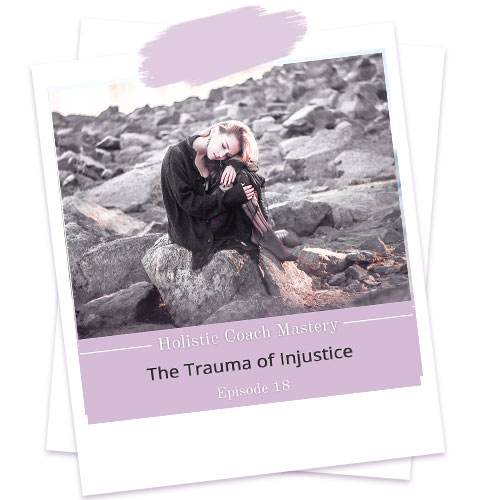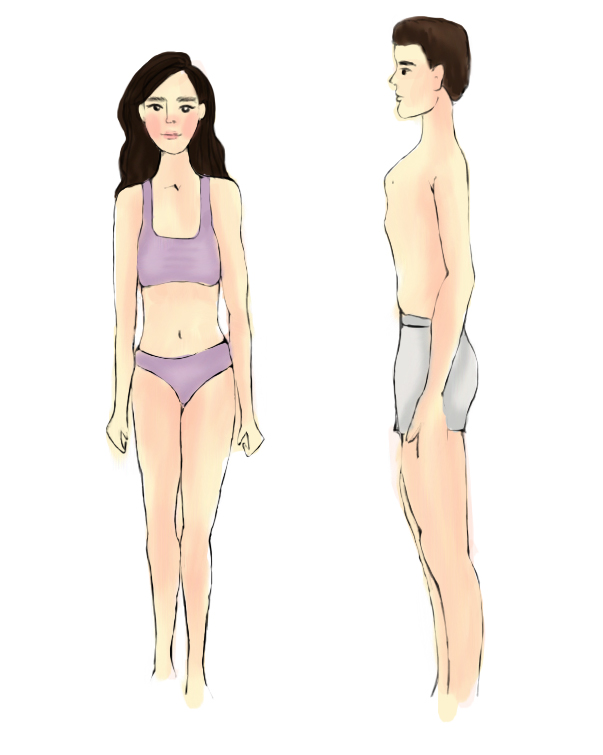
Do you feel like life or someone is unfair with you on a regular basis? Or maybe you are extremely sensitive to injustice?
In this episode we'll discuss one of the main reasons for that - the trauma of injustice. You will learn the most typical scenarios that create it and what are the consequences.
This episode is part of the series about the 5 types of trauma (episodes 13-18).
Body structure

Listen to the show
Subscribe:
You will learn
- when does this trauma typically occur and with which parent
- the body structure and other physical characteristics
- possible health issues
- the copying mechanism - the mask of stiffness
Resources
Welcome to holistic coach mastery podcast with Marina Stoichkova. It's your audio library for clarity, inspiration, and empowerment. Hello dear friends and welcome to episode number 18. This is the last episode of this series about the five traumas. And today we are going to talk about the fifth one, which is the trauma of injustice. This concept has been created by a very famous psychotherapist, her name is Lisa or ball. And in those series we are discussing the main characteristics so that you can recognize if you or someone close to you have one of those traumas and trust me, we all have one of those sometimes even more. And it also allows you to bring your awareness To transform it and to be aware of what exactly you need to heal first. And you might be wondering, okay, so if I have this trauma, I would know. Well, in reality, you don't necessarily realize that because one event might be interpreted in a different way by different people, which also means that the trauma would be different. For example, a father leaves the family when the child has been three, four years old. For one child, this could be interpreted as a trauma of betrayal, and for another, it could be injustice and all the other possibilities. So what's important is not what's the specific event or series of events, but more importantly, how you have interpreted that and what does that mean for you? And today, we are going to talk about To the trauma of injustice, one of the best ways to recognize this trauma just like any other trauma is, this might surprise you, but to look at your body structure. So based on this theory, you may recognize which trauma or which traumas you have. So for your convenience, on my website, you can find the picture we have drawn those pictures for you so that you can see how does the typical body structure look like if you have this trauma of injustice. And in Episode 13, by the way, you may find the five traumas with the five pictures so you can compare them and see which one looks the most like you. So, with injustice, the most typical thing is that those are the most proportional bodies. So if We can say something like a normal structure, probably that would be most relevant to this type of trauma. So nothing that is extremely disproportional, the body is not too slim, not too big. Usually the waist is accentuated and especially women like to kind of bring the attention to this part of the body to their waist, it looks nice usually. And overall, they have some kind of stiffness, they have some kind of tension in the body, usually in the jaw in the neck area, the shoulders the back, you will notice that they are you know, quite tense. Also, usually the skin is kind of wide like you know really wide or like pale color bail. tonality and Also, what's very interesting for them is that they really have lack of flexibility. So literally, it's difficult for them. They're just their body is not flexible, which of course also means that internally, they have this lack of flexibility as well. So when does this trauma appear? First of all, the most typical age is between four and six. Usually this is the age when we realize that we are an individual person who is separate from, you know, the other people and in the other parts of the world, which from a spiritual perspective, we know is only an illusion, but that's the time when the ego recognizes that it's independent. And usually, this is the time when something happens or there was a series of events, which make the child feel like there is something very unfair happening to them. And usually the parent who is involved in this type of trauma is the parent from the same sex. For women, this would be their mother for men this would be with their father. That's the most typical scenario and something in their behavior something in the parents behavior feels like unfair. And a very common situation is that this parent has had some kind of emotional blockage, they are cold, they are distant, they are not open, they are not like nurturing and warm. All of that is missing. And the child interprets that as something unfair as something which is definitely not okay. And on certain level, they also adapt the same way of being So it doesn't mean that you know, as a four year old child, you know, you would behave in the same way but over time, the more this person grows, the more closed they get. And you may notice, for example, very typical for those people, they like to cross their arms to cross their legs, you know, even their body gestures, their body languages, show that they are close, they are not open. And of course, it also means that they are shutting down their emotions. This is something that usually they have observed one of their parents to do, and they are kind of adapting the same behavior. So internally, they can be very sensitive and usually they are, they are sensitive, they are emotional, but all of that gets shut down. And it's like, Guys of numbness or stiffness. So everything is blocked in this is actually their coping mechanism. If you remember with the last with the previous traumas we also talked about talked about it. Each trauma brings its specific coping mechanism, or the mask, which the person wears so that they prevent the same thing to happen again for them. And with the trauma of injustice, the coping mechanism is stiffness. And they can look very rigid, very inflexible, and they really are on the surface, but internally, the motions are blocked, they can still be there, but they are blocked.
And other things that usually happen with this with this type of trauma is that they also develop perfectionism. They feel like they have to be perfect and everything they do need to be perfect. And of course, they are extremely sensitive to some future injustice in their life. So overall, what's fair, what's not fair, what's right and not right. Those are huge themes for them. And they are observing that in themselves, but also in other people. And I personally have experience with those type of people. And it's really like a huge theme for them. what's fair? Is there some kind of injustice and if there is, it's like a huge problem. And of course, no one likes injustice. I mean, even if you don't have this trauma, of course, if we ask you probably you say, of course, this is not right in justices. It's just wrong. But those people they experience pain For them, it's like the worst thing in the world. I mean, everything is so much stronger for them. Usually that's the difference. Of course, no one likes the injustice. But for them, this really traumatizes them. And they are very demanding of themselves as well so that they don't do something which would be unfair. And this, by the way, may work in very interesting and sometimes strange ways. For example, if they receive something that thought that they don't really feel like they deserve it, they may sabotage themselves, they may unintentionally lose it or break it or just feel guilty like they don't deserve to have this. And they might explain themselves even when they are grownups. When they have their money when they buy something expensive. They may try to justify their trip. Okay, I'm buying this, it's really expensive, but I deserve it because I work really, really hard for that. It's very difficult for them to accept those gifts, or anything else, which they feel like they don't really deserve. So very interesting model of the world and very interesting behavior. Of course, they are doing this with other people as well. They demand people to be fair to do the right things to follow the rules to follow all the principles. They like things to be organized and structured. And all of that is blocking the flow of energy and their spontaneity, spontaneity and basically, sometimes it really literally steals their joy because they are constantly, you know, analyzing things is a tried, what should I do? They don't allow themselves to relax. They might be working Colleagues or people who are constantly engaged with doing something. And they may not say, Oh, you know what I really feel like I don't deserve to take arrest. Of course, a few people would say that, but subconsciously that's what's happening. They might feel or believe that it's just wrong to relax and do nothing. You know, it's, it's just uncomfortable. And you may, you may also find how their bodies are also so intense even when they're sitting on the chair, they might be moving nervously. Their feet might be kind of, you know, jumping up and down, so it's difficult for the body to get relaxed.
Okay, so what else do we have?
One of the most typical emotions that those people struggle with is anger. They feel angry because they feel or they interpret something as unfair because of this injustice. Because we know that the things we fear the most are the things that we attract the most. So if you're constantly fixated on the idea, is there some kind of injustice here? Is there something which is unfair here, you will attract those type of situations, that's for sure. And when that happens is that those people start feeling anger, because it's just not right. That's not supposed to happen. They don't deserve that or whatever. So all of that brings lots of anger. And one of the biggest realizations, which is the first step in the healing process, is first of all to realize that on certain level, you are doing the same thing with yourself. I will repeat it again because Cuz it might, you know, surprise you, but that's definitely true. The traumas that we suffer from are also the traumas that we cause ourselves. So if you feel like the world or your parent or your partner or someone is unfair to you, and there's lots of injustice in the world, it means that on certain level, you're being unfair with yourself as well. And according to lisper ball, those are traumas that we have suffered from before. If you are open to the concept of finger nations, then she suggests probably this is something that we have suffered from in previous lives. So, you know, by default by coming to this world, we already have this trauma activated, and we choose parents, which will reinforce the trauma, because that's our chance to see it and eventually heal. So a very important part of this work is also not to blame anyone, no blame, no guilt, very important. The other thing is that very often, and probably almost all of the time, the parent, you have this trauma with probably has this trauma with their own parent. So those are repetitive models that go through the family tree. And, you know, very often, you know, people have been hurt before and they just don't know other ways to do things and they just unintentionally cause this to their parents to their children. So it's kind of like a vicious circle until we bring our awareness to it until we bring The light. And we realize that first of all, there is no one to be blamed. Second of all, on certain level, we are doing the same thing with ourselves. And this is only a call an opportunity for us to heal this. And once that you heal this problem, and this trauma, you will not attract those events anymore, you won't need that. And usually this is a process. For some people, it may happen quite fast. Usually, I think that we need to give ourselves more time to you know, realize everything to heal it. But once you do that, you will no longer attract those events in your life. People won't treat you in an unfair way you won't struggle with this injustice in the world and so on. I know it It's not that simple, but it's definitely possible.
Okay, so let's talk about some of the most typical body issues and illnesses.
And it doesn't necessarily mean that if you have one of those illnesses, then you absolutely have the trauma. What we are saying here is that it's much more common for people who suffer from trauma of injustice, to have one of those body issues or health issues. First of all, the one of the most difficult problems is related to inflammation. And it could be related to different parts of the body, especially some kind of Chronicle inflammation of the joints of it could be the skin it could be sorry, as is because that's caused by the end And inflammation is a sign of anger, something you are very angry about. So, different types of inflammations. Also all kinds of problems with the neck and the back area because of this, you know, stiffness, this rigidity, constipation also very common and cramps, all kinds of spasms of the muscles or other parts of the body. Also dry skin and different other skin issues including sorry, as is also problems with the blood circulation with the blood vessels and with the eyes and liver. Those are some of the most difficult issues and if you happen to have one of those things, one of those illnesses, then I would suggest you ask yourself is injustice something I'm extremely sensitive to? Is it something that's very, very painful to me? And do you ask yourself the question, okay, so do I really deserve that? Is it okay for example to buy expensive things or fancy clothes or whatever? You know, do you feel the need to explain yourself? Or to justify, okay, I bought this but it will be an investment for example. I know that's something I quite often say. But anyway, you may find your own way to justify, you know, the expensive purchases. And, yeah, this is one of the signs. So also, if you feel like one of your parents have been really cold and emotionally distant and kind of detached and it doesn't mean they are bad parents. They might Be very supportive, but emotionally they're not connecting, then this is also a very strong sign you might have this type of trauma.
And of course, you can heal that. But first where you need to start from is to stop doing this to yourself, and eventually, you will be able to heal the past. One of my favorite methods is matrix reimprinting. With EFT there are other methods from the energy psychology tools that you can use, but it's definitely something you need to address. So with that, my friends, we are finishing the series about the five traumas, incredible work, I highly recommend you to go back and check and analyze what's your body structure, what resonates with you, the most If you dig deeper, you may find okay, but I also have this other trauma. And that's all great because it means you're bringing light and eventually you can heal those traumas. So thank you so much for joining me. It's a real pleasure for me as always, and I'll see you next time.
Take care.
Thank you for listening to this episode. For more information, go to Mars stars dotnet and make sure to sign up for the free training on how to create a psychological profile with astrology.

